Metformin may be one of the cheapest and most underused weight loss medications out there.
Metformin is traditionally reserved for those with diabetes or insulin resistance, but many studies show that it can be effective in overweight or obese patients without diabetes.
The only problem?
You wouldn’t know about it unless you do the research yourself!
Use this post to learn everything you need to know about using metformin (both if you have diabetes or if you are simply just overweight):
Metformin & How it May Help With Weight Loss
Does metformin help with weight loss?
The answer is more complex than just a standard “yes” or “no”, instead the correct answer is more of a “maybe”.
What do I mean?
Well, metformin is a medication that falls into the class of biguanides.
The most popular of these medications is metformin (and the topic of our discussion today) which is being used by at least 120 million people worldwide.
Classically, metformin is used to treat blood sugar issues, insulin resistance, and type II diabetes.
It was found a long time ago, that if used for these conditions, metformin does indeed help some patients lose weight.
Studies have shown (1) that patients who take metformin with insulin resistance do tend to lose weight – most studies show a “modest” amount to the tune of around 5-10 pounds.
Because these studies have been favorable to some patients (especially those with the conditions listed above), it’s normal to ask if it also works for patients who don’t have type II diabetes.
In order to understand that, we need to understand how metformin works.
As it relates to weight loss metformin has powerful actions in 2 main areas:
In the mitochondria respiratory chain complex (2):

Activating the mitochondrial pathway is a powerful way to increase energy production and therefore metabolism in the entire body.
Metformin improves and increases the efficiency of energy production in your mitochondria.
We will discuss how this benefits your resting metabolism later in this post.
And in the liver by reducing gluconeogenesis and reducing insulin resistance (3):
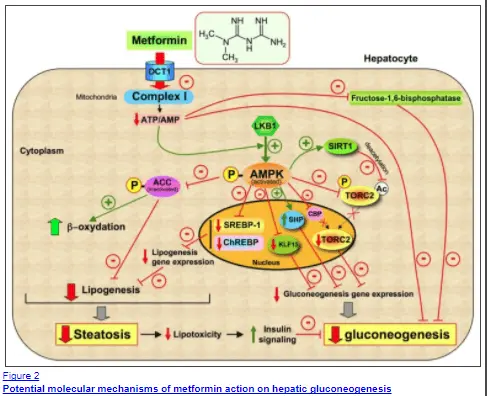
Secondly (and perhaps more importantly) is that metformin alters the production of glucose and the sensitivity of insulin in your liver and in other cells in your body.
This effect may be the primary method by which metformin exerts a powerful anti-obesity effect in many individuals.
This mechanism of action is also why metformin is commonly prescribed for diabetics or those with insulin resistance.
Now that we know how it works we can talk about how to use it properly and IF it will work for you.
While metformin was specifically designed (and most often prescribed) to those with diabetes it can actually be used in normal, overweight patients with potential benefits.
The goal here is to understand how to use it:
Metformin in Non-Diabetics
The main question that most people have is this:
Will metformin help me lose weight if I don’t have diabetes or blood sugar issues?
The answer to that question is probably…
First, let’s start with the science, then I’ll give you my opinion based on treating hundreds of patients:
Does science suggest that metformin will help with weight loss in non-diabetics?
Yes, studies have shown (4) that metformin may indeed help with weight loss in patients without diabetes.
In this particular study, patients were given metformin (2,500mg per day) for up to 6 months.
Patients treated with metformin lost on average 10-14 pounds (5.6% to 6.5% of body weight) compared to controls who gained 6-8 pounds during the same time period.
What’s interesting is that the percentage of weight loss achieved in each individual was independent of age, sex, or BMI.
This means that if you are only 5-10 pounds overweight, it’s not likely that metformin will help you lose ALL of that weight, instead, it may only help you lose a couple of pounds.
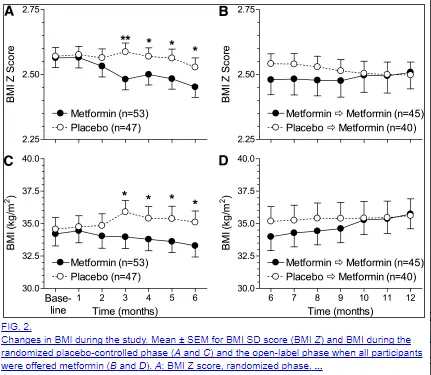
On the other hand, if you are 40-50 pounds overweight, then you may lose more than the traditional 5-10 pounds.
So how is metformin working to help patients lose weight?
The exact mechanism of action is still unclear but it probably boils down to a few important areas:
#1. Most people have some degree of insulin resistance whether they realize it or not.
It’s estimated that up to 50% of the population of the United States has insulin resistance as defined as pre-diabetes or diabetes (5) (whether they realize it or not).
Insulin resistance is defined as having elevated insulin levels despite fasting and/or having an elevated blood sugar (usually higher than 90-100 over a 12-hour fast).
Moral of the story?
Even if you are 5-10 pounds overweight there is still a HUGE probability that you have some degree of insulin resistance.
Remember:
Diabetes doesn’t just develop overnight.
It’s a disease that exists on a spectrum and it slowly develops over 10-20+ years (depending on the person).
Those with even mild insulin resistance (who may one day develop diabetes) stand to benefit from the glucose-lowering effects of metformin which may be on the reasons that it helps most people lose at least some weight.
#2. Metformin may help reduce or normalize appetite.
Secondly, metformin has been shown to modulate appetite (6).
Most people would consider a reduction in appetite a good thing, and in some cases, it may be, but in most cases, it may be damaging.
You never want to eat too few calories for too long or it will cause severe metabolic damage.
Having said that, some people do suffer from conditions that may cause an increase in appetite that is almost uncontrollable.
Conditions such as leptin resistance (which modulates brain satiety), food addiction, and binge eating disorders all result in the consumption of excess calories which may lead to weight gain long term.

Unfortunately, it’s not as easy as just reducing calories in these people because there are powerful hormones that influence appetite.
One way to combat this is by taking medications that “normalize” your appetite (notice I didn’t say reduce your appetite).
You only want to reduce your appetite if you KNOW that you are consuming too many calories.
Metformin may help to normalize caloric consumption and promote energy production thus stabilizing basal metabolic rate and caloric consumption.
#3. Metformin may improve muscle mass, energy production and therefore your metabolism.
Lastly, metformin has been shown to improve metabolism through a variety of factors.
Whenever insulin resistance is present your muscles will start to atrophy.
Why?
Because insulin directs excess calories straight to fat cells which necessarily reduces the number of calories available for muscle use.
Think of it as a tug-of-war between your muscles and your fat.
You always want your muscles to win that war because then those calories will be used and burned up as energy.
If your fat cells win that war then they will grow and you will gain both fat mass and weight!
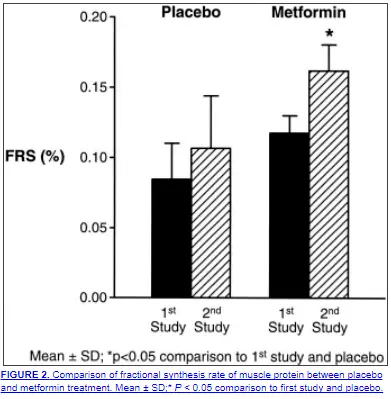
Insulin tips this balance in favor of fat cells which necessarily causes atrophy of muscle tissues.
This is one of the reasons why severely obese patients have very small muscle mass and muscle volume (they are starving from the inside even though they consume massive amounts of food).
Taking metformin will increase muscle metabolism (7), and promote muscle growth all by reducing insulin resistance and insulin sensitivity.
Metformin in Type II Diabetics
Will metformin work for you if you have insulin resistance, high blood sugar, or a diagnosis of type II diabetes?
There is a VERY high chance that it will help you lose some weight. How much weight is a different question entirely.
How much weight you lose will depend on the status of your diabetes, how much insulin resistance is present, and if you are taking insulin already.
Metformin has been shown to help those with type II diabetes in many studies:

The effect of weight loss in those with type II diabetes is around 5-10 pounds (if it will help you lose weight).
The problem with using metformin in those with type II diabetes is that in order to sustain the weight loss that they may achieve while using it, they have to continue to use it indefinitely.
If you lose 5-10 pounds while taking metformin, and then stop the medication, that weight is very likely to come right back.
With that in mind there are a few things you should consider if you are using metformin for weight loss and you have blood sugar issues:
#1. You need to make sure you are on the right dose
We will discuss the dose below, but for now, just realize that in order for the medication to be effective you need to be taking enough of it.
Taking a small dose of 500mg per day and hoping for the best is not a good approach.
#2. You should never use metformin as a monotherapy for weight loss.
Second, and probably more important, is that you never want to use JUST metformin by itself.
Metformin, by itself, is not a strong or powerful medication.
It becomes more powerful and more effective when it is combined with other therapies and lifestyle changes.
As you will read in most studies, they always recommend the COMBINATION of metformin with changes to your diet and exercise routine.
Beyond these basics, you will also want to consider combining metformin with not only other medications but also with other supplements.
Believe it or not, many supplements have been shown to be just as effective at reducing blood sugar as metformin.
By combining supplements with metformin you can improve your weight loss results but also keep your dose of metformin down lower (thus reducing negative side effects).
Metformin Dosage for Weight Loss
Is there a dose that you need to be taking in order to achieve weight loss with metformin?
Some people may not realize it, but dosing matters quite a bit – especially with weight loss (of all medications and supplements).
In order to obtain certain and specific results, you must ensure that you get enough of the substance you are consuming to achieve therapeutic benefit.
Metformin is no different.
Taking 500mg of metformin daily is not likely to help you with weight loss! And this is a standard starting dose of metformin that most physicians give out.
The dosing of metformin typically ranges from 500mg to 2,500mg per day.
Does this mean that you need to jump up to 2,500mg per day to get results?
Maybe, but there is a smarter way to approach dosing.
You should consider the therapeutic dose of metformin to be somewhere between 1,000mg to 2,000mg per day.
What this means is that you need to be taking somewhere between 1,000mg to and 2,000mg per day in order to get optimal results.
It’s also worth pointing out that if you see some weight loss at 1,000mg per day you may not double those results simply by taking 2,000mg per day.
Why?
Because of a concept known as diminishing returns (which applies to MOST medications and MOST supplements).
Basically, once you have achieved some level of saturation in your body of metformin, further increases in metformin won’t increase your results.
Now how do you know where to start?
In general, you can follow these guidelines:
If you are using metformin as monotherapy (meaning metformin is the only medication you are taking – which I don’t recommend) you should be taking a higher dose.
If you are using metformin as one of several therapies (which I do recommend) then you can get by with lower dosing of metformin – around 1,000mg per day.
The bottom line?
Make sure you are taking ENOUGH metformin to ensure proper cellular function before you give up and say it doesn’t work.
More important than how to use metformin by itself, is how to use it in conjunction with other therapies…
Combining Metformin with Other Therapies
Without a doubt, the best way to use metformin is in combination with other therapies.
This includes in combination with prescription medications and in combination with targeted supplements.
Why is that?
The reason is simple:
Weight gain is a complex process that involves multiple hormone systems and regulatory processes.
That means using 1 medication or targeting 1 pathway means you are only treating PART of the problem and not ALL of the problem.
In addition, adding other therapies allows you to synergize therapies and treat the same problem from multiple angles.
So which medications help boost the effectiveness of metformin?
Below I’ve outlined several therapies including how to get further information on each of them:
- GLP-1 agonists –> these medications help lower insulin and leptin and lead to considerable weight loss if used by themselves.
- Naltrexone (Low dose naltrexone) + Wellbutrin (or either by themselves or in combination as Contrave) –> These medications help alter appetite and primarily modulate appetite and body set point and tend to work in specific people.
- Cytomel or other thyroid medications –> Many patients who suffer from obesity have low T3 levels or some element of thyroid hormone suppression.
As an example, you can see the combination of a GLP-1 agonist plus metformin resulted in far greater weight loss than just either alone.
This study (8) compared metformin by itself to Victoza by itself to the combination of metformin plus Victoza.

Alternatively, you can also use certain supplements to boost weight loss with metformin.
I recommend using supplements that target the insulin resistance pathway or other supplements which have scientific data proving their efficacy:
- Fish oil –> Fish oil has been shown to increase muscle mass, reduce inflammation and directly lead to weight loss. Using up to 3 grams per day is optimal for these results (you can read more about fish oil here & weight loss here).
- Berberine –> Berberine helps to reduce blood sugar, and insulin resistance and promotes muscle growth. To get these benefits you need to take up to 1,000 mg per day.
- Alpha lipoic acid –> Alpha lipoic acid (or ALA for short) is a powerful anti-inflammatory agent which also helps with weight loss if used in high enough dosages. Use up to 1,200mg per day for best results.
- Probiotics –> Probiotics help normalize appetite, reduce caloric absorption and increase metabolism. You can learn all of the ways that probiotics help with weight loss here. The weight loss dose for probiotics is around 200-300 billion CFU of multi-potency bifido/lacto species.
Is it Safe to Try Metformin for Weight Loss?
After reading all of this information it may be tempting to jump on the bandwagon and make an appointment with your doctor to get metformin, but does that mean you should?
Like anything, you need to make sure the benefits outweigh the risks.
When it comes to metformin the potential negative side effects, and therefore downside is very low.
Metformin is generally a very well-tolerated medication with the most common side effect being mild gastrointestinal distress that is usually dose-dependent.
Rarely, some patients may have more serious conditions such as lactic acidosis (9) – but this side effect is very rare and very difficult to miss.
All of the side effects of metformin resolve upon discontinuation of the medication, further reducing the risk of any potential downsides.
If you decide to start metformin you will need to start out at a low dose and slowly titrate your dose up to higher dosages (as tolerated).
If you start low and go slow you will dodge most gastrointestinal issues.
Another potential benefit of using Metformin is the price.

The cash price (with or without insurance) is $4.00 for a month’s supply.
While some supplements may be more effective than metformin, they can often cost significantly more, so this provides a viable alternative for those that need to be cost sensitive.
If possible you should combine metformin with supplements for better results, however!
*Note: Because someone almost always asks, I don’t have any connection with the pharmaceutical company that creates metformin. I simply provide this information to help those that may benefit from it.
Will your Doctor Prescribe it?
Compared to other medications that I discuss on my blog, metformin is actually rather easy to get from your physician.
The reason is simple:
Physicians are used to prescribing metformin because it’s one of the most commonly prescribed medications for diabetics!
It may take some convincing to get your doctor to prescribe metformin for you for weight loss (especially if you aren’t significantly overweight) even though studies indicate it does help in nondiabetic patients.
The best way to get around this is to simply print out an article listed in this blog post and bring it to your doctor.
Doctors understand the language of clinical studies and will be very likely to provide you with a prescription if you provide sources that prove it is effective.
Remember:
Your starting dose should be around 500mg per day but you will need to get up to 1,000 to 2,000mg per day for optimal results.
It can also take several months to achieve these results, so don’t get impatient.
Back to you
Let’s wrap it up:
Metformin is a great, cheap, and effective medication that may help with weight loss in those patients who are diabetic and those who are not.
Metformin works by targeting insulin and glucose pathways in the body and by directly altering both liver and mitochondrial function.
The net effect of these changes results in weight loss that tends to be based on your starting BMI.
It’s also a relatively safe medication to take and can be combined with other therapies such as supplements and other medications for even greater benefit.
Now I want to hear from you:
Have you been thinking about using metformin for weight loss?
Did it work for you?
Why or why not?
Leave your comments below!
Scientific References
#1. https://www.ncbi.nlm.nih.gov/pmc/articles/PMC3028347/
#2. https://www.ncbi.nlm.nih.gov/pmc/articles/PMC3398862/
#3. https://www.ncbi.nlm.nih.gov/pmc/articles/PMC3398862/
#4. https://www.ncbi.nlm.nih.gov/pubmed/23147210
#5. https://www.ncbi.nlm.nih.gov/pubmed/17967708
#6. https://www.ncbi.nlm.nih.gov/pubmed/9526970
#7. https://www.ncbi.nlm.nih.gov/pmc/articles/PMC1356920/
#8. https://www.ncbi.nlm.nih.gov/pmc/articles/PMC4812364/
#9. https://www.ncbi.nlm.nih.gov/pubmed/18536788





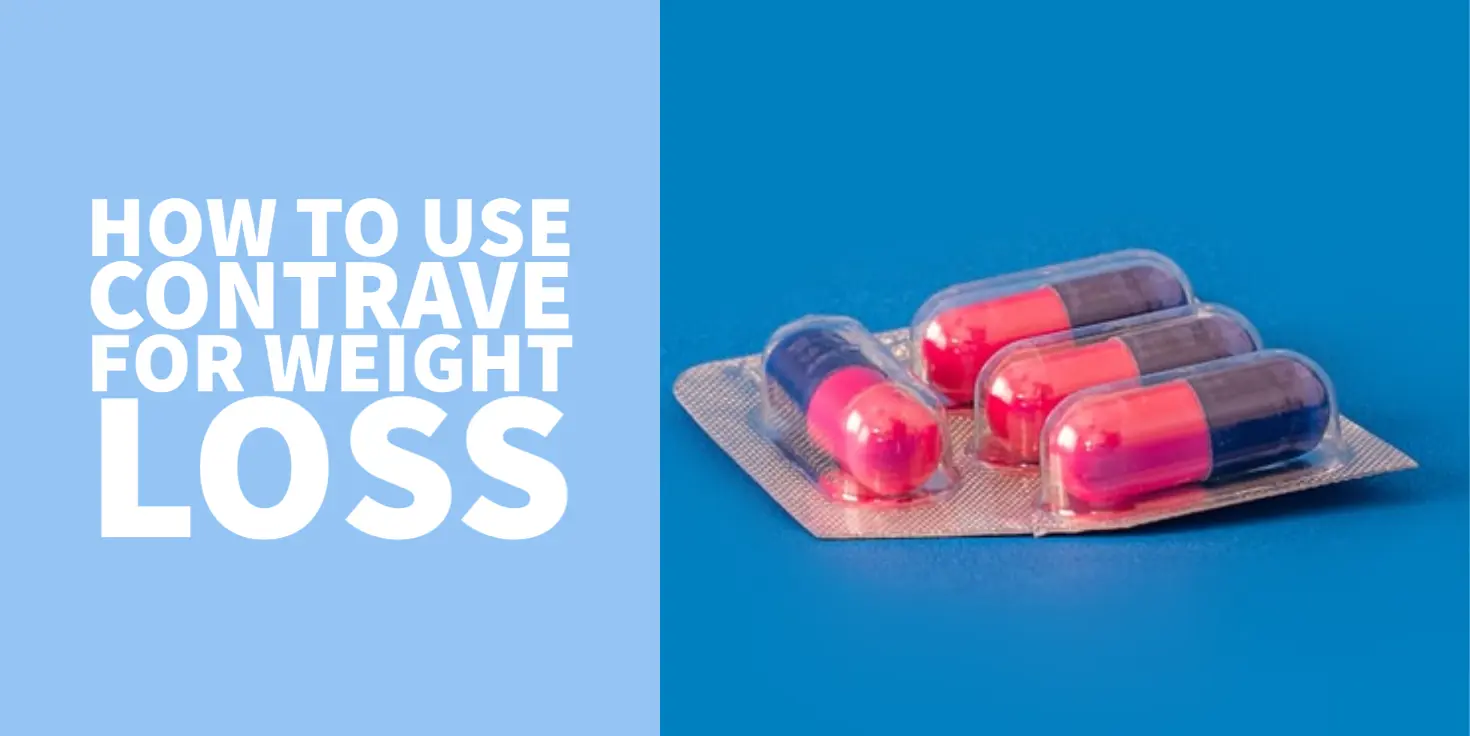
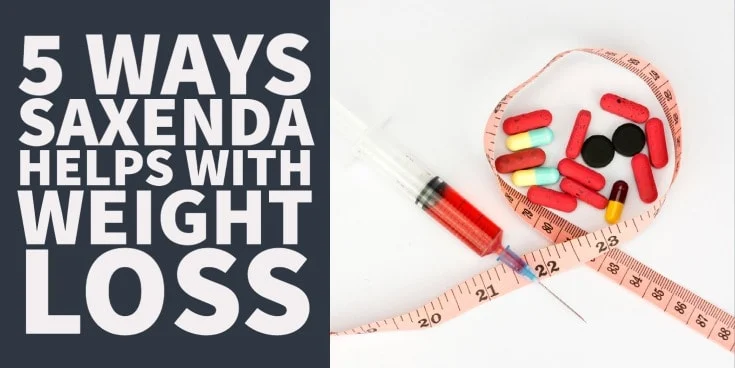


I appreciate your posts and website Dr. Childs.
I was prescribed Metformin (500 mg, taken 2x/dy) for insulin resistance and after a couple weeks of I noticed the onset of muscles aches in my legs and soreness eventually around my diaphragm. My doctor took me off the medication and said I had an allergic reaction.
Hi Anita,
No problem and glad you find them helpful. Not everyone will tolerate metformin (and that’s okay), but there are plenty of other medications/supplements/etc. that you can try to treat insulin resistance – many are listed in this post.
I have tried for years to reduce my A1C — paleo diet, exercise, supplements (ALA, Berberine, chromium) to no avail. After reading your posts, I decided to get my doctor to prescribe a medical therapy, Metformin, to address insulin resistance and prediabetes. It worked. I experienced no ill effect, no digestive problems at all. Interestingly, my dose was only 500 mg, once a day. Perhaps it could be raised. I don’t know. My A1C is now 5.2, down seven tenths. Weigh remains stable.
Hi Cleo,
Glad it’s working for you! Thanks for sharing.
Hi Dr. Childs,
I am a 41 year old mother in great shape (at least externally), who suffers from inflammation throughout my body. I’ve been taking LDN and Metformin for 2 years and it helps significantly, however the inflammations is still ever present. I also take a T3/T4/Armor compound which I have to continue to monitor And adjust the dosing every few months.
I’ve been working with a well regarded published naturopath MD, who understands LDN/Metformin/Thyroid well, but much of the treatment protocol has been architected by me-through my research. I am a dr of law, but no MD. I know that if I could fine tune my treatment with someone such as yourself, I could finally get the optimization of results I seek, as opposed to constantly fighting an uphill battle.
Are you taking on clients? Perhaps in this new zoom world that might be a possibility? If so, please let me know how I might get in contact with you.
Regards,
Jennifer Bayles, Esq.
I’m wondering what you perspective is on metformin for someone who has had a TT due to cancer?
I have been taking metformin for 2 years now. The first 6 months it was like magic – the weight fell off.
Then, right at 6 months, I literally blew up like a balloon… I packed on 40 lbs within 6 weeks. I went to my doc crying and he insisted that was not possible and that my memory must be off.
Since that time, no matter what i have tried, I cannot lose weight. Fasting, keto, paleo, 3 hours exercise daily, taking all the supplements and vitamins.
Not only that but my tsh is at .009 nothing I do with my combo of synthroid and naturethroid makes a difference. I broke my collarbone with no injury and have 3 cracked teeth. I’m extremely worried about osteopenia.
other weird symptom is my lower back ached ONLY when sleeping, so badly that I have to wake up. The minute I’m moving it stops, it never bothers me when I’m awake.
I’m starting to think its the metformin? Is that possible or am I just missing symptoms for something else?
Hi Fini,
It’s hard to say what is causing your issues but the first place to start is with a comprehensive set of labs to check for all nutrients, sex hormones and basic hormones in your body. I don’t think metformin alone would be causing all of these issues but it’s a fairly easy theory to test.
Is Metformin safe to use if you take furosemide? I take Synthroid 175mcg, Cytomel 35mcg, furosemide 60mg potassium 32mEQ, Valtrex 1 gm, selenium 200mcg, zinc 30mg, magnesium 800mg, fiber you recommend and fitbiotics (probiotic) and have added Metformin 500mg a day for A1C 5.7.
Is it ok to take metformin when your A1C is 5.1% and you feel hypoglycemic episodes daily? My doctor wants me to start metformin for leptin resistance but my fasting insulin was less than 5 and my fasting sugar is always 75-88.
She thinks it will help me lose weight and decrease my leptin.
Thank you, Dr. Child’s!
I have been using Saxenda for weight loss and it has been incredible. I have tried EVERYTHING else to no avail. My new doctor can’t prescribe Saxenda and suggested Metformin. I will be starting tomorrow night. Fingers crossed! Your article answered a lot of my questions.
Hi Samantha,
Compared to metformin, Saxenda would be like an atomic bomb and Metformin would be like a BB-gun. Maybe not quite like that, but you get the idea.
Thanks again, Dr. Childs. That is exactly what I thought as the Metformin isn’t working at all!
SADEXA IS THE BOMB LOST 21 POUNDS. BEEN OFF A YEAR NOW AND GAOINE 8. UGH MY FAULT STOPPED WATCHING WHAGT I EAT. WILL BE TRYING METFORMIN MYSELF AS OF TOMORRW. BEST OF LUCK TO YOU AND YOUR JOURNEY.
Thanks again, Dr. Childs. That’s what I thought as the Metformin isn’t working at all!
Hi Dr. Child’s
I’m 20 years old and got put on Metformin last summer, I got up to about 1,500mg in about a month and lost about 10-15lbs… I stopped taking it because my blood sugar levels were back to normal and I noticed I felt nauseous sometimes towards the end of taking it. It’s the summer after and I noticed some weight gain, I still have about half the bottle of Metformin left from last summer- am I able to start back up on Metformin in hopes the weight loss will happen again??
I think Victoza and Saxenda have huge potential in weight loss. It’s the only thing that ever worked for me. However, I am concerned about the pancreatic cancer concern (in non-diabetics). Certainly, not the side effect worth any amount of weight loss. No matter how helpful losing weight is to your overall health. Thoughts?
Hi HK,
If you use it temporarily then the risk should be mitigated close to zero. You can learn more about how I recommend using it here: https://www.restartmed.com/victoza/
I have been on Metformin 1500 mg for insulin resistance for about a year now and did experience about a 20 lb weight loss in the first 6 months of use. My Dr added Trulicity when the weight loss slowed but I have had no loss at all since then. Is it possible that the Trulicity is counteracting the weight loss effects?
Hi Rachel,
That’s very unlikely. In terms of potency, Trulicity is probably 10x more powerful than metformin at helping with weight loss. Your plateau probably has more to do with other factors such as other hormones which may be out of balance.
Hi Dr Childs
I have never had a weight problem in my life and then I suddenly gained 25 lbs in a little over a month last year. I eat really well, walk and/or practice yoga several times a week. I’ve tried dr prescribed weight loss supplements, contrave, Keto, whole 30, mitochondrial diet, low carb, 1200 cals a day, 1500 cals a day and I cannot lose an ounce. I am currently taking 50mg T4 once a day and 5mg T3 twice a day. I take 2000mg metformin at dinner. I have High midnight and morning cortisol which I treat with supplements. I am beyond frustrated. What else can I try?
Hi Kelly,
The best approach is to figure out what caused the weight gain and then treat that problem. If you just throw random therapies at your body without knowing why then you will have a very difficult time losing the weight. You should start with a comprehensive set of labs and hormones.
Hello DR. Childs,
I am 45 and desperatly want to have another baby, I have read that metformin is great for fertility help, what are your thoughts on this, also If you have any other suggestions I would be grateful to you. Sarah
Hi Sarah,
Metformin doesn’t help with fertility, it helps reverse some medical conditions that can potentially cause issues with fertility. If you don’t have those conditions, though, then it probably won’t do much for you.
Hi Dr. Childs,
I have been on metformin for about a year and a half and have lost about 40 lbs. I am up to 2500 mg and have plateaued, I still have about 20-30lbs to lose. I was wondering if I could drop down to 1500mg and then go back up to 2500 to jump start the weight loss again?
Hi Amanda,
That is not likely to work but you can certainly give it a try. Instead, I would probably recommend that you look at other hormones which are probably contributing to your weight including leptin and thyroid hormone. You can find more info here: https://www.restartmed.com/how-to-diagnose-leptin-resistance/
Hi Dr. Childs,
If you took Metformin and Saxenda together, do they work synergistically and produce more weight loss? Or do they work independently of each other to produce results? Thanks 🙂
Hi Katherine,
As far as I can tell they both work independently and synergistically with each other.
Wow, wish I had seen this article earlier. I take 2000mg of Metformin per day, which was not helping with weight loss. I started Saxenda, and it started working immediately at the 0.6 dose. I titrated to 1.2 and am still losing–7lbs in 2 weeks. My question—should I dial it back to the lower dose that was working or stay at the higher dose?
Hi Michele,
I have a specific way that I recommend dosing for Saxenda and it’s too complicated to list here. It is contained inside my weight loss program, however, which you can learn more about here: https://www.restartmed.com/hormone-mastery/
I started Metformin 500 last July for pre-diabetes and the stomach problems were bad. They switched me to the 500 extended release and I feel great and have lost 12 pounds. I also take probiotics and fish oil. Thanks for your article Dr. Childs.
Hi Amy,
You’re welcome! Thanks for sharing.
Hi there,
I already take Berberine for my liver (I have autoimmune hepatitis with PBC overlap) and I have read that it works as well or better than Metformin. Is it safe to take together?
My dr finally put me on straight liothyronine (since I have conversion problems) and I am hoping to see some pounds drop off soon. Just got my jar of functional fuel too!
Hi Stephanie,
That’s great! And there shouldn’t be an issue taking both metformin and berberine together.
I’m not diabetic taking 2000 mg Metformin per day for over a year now but didn’t lose any weight so far. At the same time, the lower back pain at night is so bad that I have to wake up. Very disappointing…
Hi Tanya,
Usually by the time you have type II diabetes your insulin resistance is so bad that metformin doesn’t really work. It would probably have been slight more effective if you used it many years earlier.
Tanya’s comment above about the night time lower back pain, is that a metformin side effect?
I’ve just spent the last 4 months (and about $4k in medical bills) trying to figure out why for the last 3 years I have been having this night time lower back pain.
If someone knows anything please help!!!
Dr. Childs – Is it safe to take Metformin with Hashimoto’s?
Hi Renee,
Yep! You can use metformin if you have Hashimoto’s.
How do you take it? Once a day or a few times a day? Morning/evening? With a meal? I’m so happy I found your article. It gives me hope.
I am non-diabetic and non-PCOS but do have Hashimoto’s and need to lose 40-50 pounds. I started metformin about a month ago and am up to 1500mg per day. At this dose I feel like I am starving all the time and I crave sweets, which is not the norm for me – I usually crave salty foods.
Started metformin because I asked my doctor about starting Saxenda and metformin. She wants me to give metformin a couple of months then she will add the Saxenda. Is this constant feeling of hunger and sugar craving normal?? Perhaps the dose is too high for me?
My hormones have been checked and are being taken care of through estrogen and testosterone pellets and progesterone pills along with Armour thyroid and Cytomel. Adding Cytomel a few years ago made the weight melt away but when it was out of production the generic didn’t help and I gained. Just desperate to get the pounds off.
Looking forward to adding Saxenda but if I’m having these weird cravings on metformin maybe Saxenda isn’t a good choice for me?
Wondering if you have ever seen/heard of incidences of people taking metformin experiencing mid-back pain, in my case, it was only while sleeping. The pain would start around 3am and would be so intense, I would be forced to wake up. The pain would stop after I was up and moving. It rarely bothered me during the day, only around my period if I went for a hike in the afternoon. Weird, right?
I suspected kidneys or adrenals because that is where the pain radiated from. Also, I felt a slight soreness when I would do happy baby at yoga, rolling from side to side, I felt a twinge of pain which I suspect was kidney or adrenals? Kidney labs are A.OK. Serum cortisol is ok, but dutch test shows its very low, like flatlined, doesn’t peak at all. Cortisone peaks, but not cortisol.
Anyhow, when I approached my doctor about the back pain, I was referred to an ortho. They did MRI’s and bone scans (because I had previously had thyroid cancer, so they were concerned it was metastasis) and they found that I had one benign tumor in my illac bone, which was coincidental and much lower than where I experienced the pain. In the area I had the pain, they found 4 hemangioma, which are supposed to be asymptomatic 90%+ of the time. So they referred me to a surgeon who was supposed to done spine surgery.
I never went to see the surgeon. My gut was still telling me it was adrenals or kidneys and that the hemangioma were actually asymptomatic and just found coincidentally, therefore spine surgery would be stupid.
So I stopped taking all medications and supplements (except thyroid meds) last September for 3 month period and the pain stopped and I began sleeping thru the night. Hooray!
Then, my integrative doc put me back on metformin (2000mg/day) last month. Within 2 weeks, the night time back pain was back. I stopped taking metformin again, and it’s taken about 3 weeks now for it to stop (weirdly, last day of my period was the last day I had the night back pain).
Metformin seems to be revered by every integrative doc I have seen, they say its the best treatment for my PCOS/insulin resistance, that it is anti-aging and even has shown anti-cancer effects, so they all want me on it.
Have you ever heard of such a thing and curious what you think could be the cause of it?
Does it matter if it’s immediate release or extended release Metformin? Wondering if one is better for weight loss and/or leptin/insulin resistance.
Or if both forms of Metformin are equally as beneficial?
Hi Meredith,
Both can work, so it doesn’t really matter.
Hi Dr. Childs,
I was a borderline diabetic for many years. As a 5’11” guy I gradually became obese and weighed 245 lbs. During the pandemic I lost 10 pounds (my wife and I used to walk 5 miles a day and usually have a light lunch. We’re both retired). Anyway I put my annual physical exam off for almost a year due to the pandemic and when I did I was diagnosed with type 2 diabetes and prescribed Januvia which I used for 2 months (my a1c was 8.7) until I as saw my endocrinologist (after taking Januvia and completely changing my diet—no carbs or very low carbs, no sweets, which was not too bad because I used to have a sweet tooth) my a1c dropped to 7.1. He then prescribed Metformin. Since then (2 months later) I’ve lost an additional an additional 20 pounds (a total of 35 pounds in a year) and continue to lose. My wife says that I’m a compliant patient and keep my glucose levels at the lower spectrum of a diabetic. Today I’m at 210 pounds and hoping to reach my target weight of 185 pounds for my height in a few months. I’ve heard that Metformin helps with weight loss. BTW with the pandemic my exercises have been almost non existent (except for my wind instruments which I play 4-6 hours a day). I’ve not sure if Metformin helped me with my gradual weight loss. If it did, I hope it can help other (type II) diabetics cope with their weight loss.
Hi Ant,
That’s great! I’m glad that it’s working for you and thanks for sharing. In regards to your comment, yes, metformin can help some people lose weight so that may explain some of the additional weight loss.
I’ve been on Semaglutide for about 7 weeks with extremely slow weight loss. Yesterday I asked about Metformin and my doctor wrote a script for 500mg once daily. I’m hoping it will help boost my weight loss. I’m also on Armour and Cytomel.
well been on metformin about 4 month now lost 35 pounds at 1000 mg daily taken in AM. blood work looks good as losing the weight still weekly 1 to 3 pounds a week .
Hi Jeepster,
Glad it’s working for you!
Thank you for providing one of the most helpful and educational resources on this medication and breaking it down in practical terms. I have one question for you, Dr. Childs. I have been prescribed 2,000mg daily dosage. Once I build up to 2,000mg, is it more effective to take two 1,000mg doses a day or divide it into four 500mg doses? I am wondering if a bigger dose is more effective or if it’s better to have a steady influx of the medication throughout the day at smaller doses? I can’t seem to find this answer anywhere so I really hope you can educate me on which method will have the biggest impact on insulin resistance, etc. Thanks doctor!
Hi Teresa,
I haven’t really seen anything to suggest that splitting your dose into 4 doses versus 2 is better. You get diminishing returns going above 1,000mg anyway so I don’t think the splitting of the dose matters all that much.
Hi Dr. Childs,
Is it ok to use metformin, alpha lipoic acid and berberine all together? I’m currently taking metformin 1000 mg ER twice a day and I’m not losing weight. I’m hoping that adding supplements will help boost weight loss. Are all three together too much?
Hi Shanda,
It shouldn’t be an issue to use all 3 together. Many people have in the past but your own personal mileage may vary.
Hi Dr Childs,
I was prescribed metformin for PCOS in 2007. I lost a stone easily then followed a diet an lost a further 2 half stone.
I live in the uk, then I changed Dr,s 2012 who stated they could no longer prescribe Metformin for PCOS . I had to be diabetic to be prescribed metformin in the UK.
I have since gained nearly 5 stone an am sure I am insulin resistant.
Any supplements you could please suggest?
Many thanks
Hi Kathryn,
Yes, please see these articles below for more information:
https://www.restartmed.com/berberine-weight-loss/
https://www.restartmed.com/alpha-lipoic-acid-weight-loss/
https://www.restartmed.com/fish-oil-weight-loss/
https://www.restartmed.com/glucomannan-weight-loss/
The best explanation on how metformin aids and works on weight loss, very simple and straightforward and easy to understand for some of us
Hi Molly,
Glad you found it helpful!
So far i have been on Metformin for almost 2 months and have gained 2 pounds , i follow a strict diet , when the weather allows i walk a mile each morning and i ride my stationary bike 20 mins twice a day (i had hip and knee surgery hip done in 2021 and knee done in 2022 ) , my doctor started me out on 500 mg a day and when I saw her next and my weight went up she put me on 1000 mg a day what is the max dose i can ask for . I have been told i am morbidly obese and i need hernia repair surgery but the surgeon will not do it unless i lose a lot of weight
Hi Cathy,
I would recommend taking a look at these prescription weight loss medications which are more effective than metformin for most people: https://www.restartmed.com/prescription-weight-loss-medications/
Thank you for this great article! It is so helpful and explains so much. I have been on Topiramate for weight loss (75mg) for the last two months and have not lost any weight as of yet. My doctor has added Metformin to help provide a “kickstart”. Have you seen this before with these two medications?
Thank you for your help,
Sarah
Hi Sarah,
Yes, it’s very common to hit plateaus.
Hi Dr Childs
What is yr opinion regarding metformin for inflammation?
I’m hoping it will help with my osteoarthritis and reduce my susceptibility to dementia
Thank you
Hi Jennifer,
I wouldn’t personally use it for inflammation because I think there are better natural options available. Things like fish oil, berberine, alpha lipoic acid, turmeric, etc. work very well for reducing inflammation. You can find a list of natural options here if you are interested: https://www.restartmed.com/anti-inflammatory-supplements/
ARe you able to prescribe metforim here? Is that what the discount is on? I sure need to loose my belly and get toned! Thank you
Hi Julia,
You will need to reach out to your primary care doctor to get a prescription for metformin. It shouldn’t be hard to get it, though, espeically considering how easily GLP-1 agonists are handed out nowadays!
Thank you for this straightforward and informative article. I had been attempting to start a weight-loss medication through Weight Watchers, but due to my recent high blood pressure levels, I was advised to consult with doctor which I did. She is truly exceptional, in my opinion. After discussing the matter with her, it was determined that I would not pursue the Weight Watchers medical medications. However, after conducting some research, she decided to prescribe me the medication mentioned in this article, which I was previously unfamiliar with.
I am among those who do not have type 2 diabetes or any issues with blood sugar levels. I undergo testing at least once a year due to another medical condition and am pleased to report that this is one area I have not had to worry about.
Thanks to this article, I feel more confident and am no longer as concerned about the potential side effects. I also made note of the supplements that were suggested. I plan to order some of them tonight and include my husband in taking them as well, particularly Berberine, as he has a family history of diabetes. I am worried he may already have or is at risk of developing type 2 diabetes. Once again, thank you.